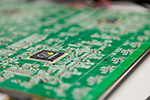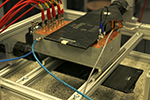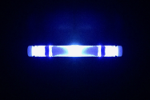The PRISMA Detector Lab promotes the collaboration and facilitates the exchange of experiences and technologies within PRISMA+. It consists of laboratories and workplaces, where scientists with different expertise and students share a common environment and infrastructure. As part of the collaborative development, the Detector Lab offers access to its own specialized laboratories, high-quality equipment and design software. For the test and characterization of detectors and electronics, also the electron and photon beams at MAMI and the irradiation facility at TRIGA are available.
In order to support the experimental activities in the research areas, the Detector Lab is organized in four branches:
 |
Electronics Including the design of high-speed boards for fast data analysis and digitization, analog signal-processing circuits, low-noise and low-power systems, trigger-less architectures and radiation hard electronics. |
 |
Photosensors Featuring single photon sensitivity, a high detection efficiency, a large active area and/or high granularity, e.g. for the usage in calorimeters, Cherenkov detectors and astroparticle physics experiments. |
 |
Tracking Detectors and Time Projection Chambers (TPC) Aiming e.g. at systems providing excellent spatial resolution at high intensities, large-area gaseous detectors, TPCs based on noble liquids and Gas Electron Multiplier (GEM) and Micromegas applications. |
 |
Laboratory for Scintillation and Fluorescence Detectors (LSFD) Being set up within the scope of PRISMA+ as new infrastructure for the development and characterization of scintillation and fluorescence materials. |
Examples of Projects:
ATLAS
- Construction of drift panels for the muon detector upgrade (completed)
- Prototype board of the topological trigger for the calorimeter, featuring high-speed multi-FPGA data processing and optical communication
- Feasibility studies for the High Granularity Timing Detector
CALICE
- Characterization of Silicon Photomultipliers (SiPM)
- Development and test of high-granularity calorimeter components
- Automated assembly of scintillator tiles on SiPM readout boards (completed)
ICECUBE / ICECUBE-GEN2
- Characterization of Photomultiplier Tubes (PMT)
- Research and development for the electronics and the testing of the Digital Optical Module
MAGIX at MESA
- Feasibility studies of focal plane tracking detectors
P2 at MESA
- Research and development for the tracking system based on monolithic pixel detectors
XENON1T / XENONnT
- Characterization of the muon-veto optical properties (completed)
- Measurement and scanning of high-voltage electrode planes
The Detector Lab also provides a venue for project-independent long-term research and development activities for novel, innovative detector technologies. Besides the regularly scheduled users meeting, the Detector Lab organizes technical seminars with external speakers to offer an overview on modern technologies and other topics of interest to the experimental physicists and engineering/technical staff within PRISMA+.
